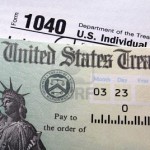 This is the season for tax refunds, and don’t think that the bankruptcy trustees don’t know it! Like sharks around a bucket of chum, there is little that can get a trustee into an excited frenzy like a debtor coming in to bankruptcy court with a sizable tax refund.
This is the season for tax refunds, and don’t think that the bankruptcy trustees don’t know it! Like sharks around a bucket of chum, there is little that can get a trustee into an excited frenzy like a debtor coming in to bankruptcy court with a sizable tax refund.
But with a little knowledge and planning, you can protect your refund even if you file a chapter 7 bankruptcy case.
First off, we start with the principle that a tax refund is an asset you own in a bankruptcy case. It’s an asset when you get the refund check, its an asset when you are waiting for the check, and its even an asset before you have made out your return.
The next important thing to know is that there is no specific exemption for tax refunds. So it is at risk for being turned over to the bankruptcy trustee if you file a Chapter 7 case.
So what can you do about this? There are two basic strategies.
First, you could spend the money before filing the case. Just as a for-instance, you could use it to pay your bankruptcy attorney! Trust me, your bankruptcy attorney loves this option . . .
You could also spend it on goods that will unquestionably be exempt when you do file the bankruptcy case. Furniture would be an example, but there are many other classes of exemptions, and a bankruptcy lawyer can give you an idea if what will work and what won’t. If you are in the Merrimack Valley area, you can call me at 978-975-2608 if you need help.
The other strategy is to apply your “wild-card” exemption to the refund. This will vary a bit depending on where you live, but many debtors will have enough of a wild-card to protect the whole refund check.
Just to give an example, most debtors in both Massachusetts and New Hampshire can claim federal wild card exemptions up to an amount just short of $12,000. This is used to protect liquid investments not covered elsewhere in the bankruptcy code. So if you had a $3000 refund coming, and $8000 in a bank account already, the $11,000 total is still yours to keep, and you still have some wild card left over for something else (a second bank account), for example.
So with good planning, and by filling the bankruptcy schedules out correctly, it is frequently possible to protect tax refunds while filing for bankruptcy!
By Doug Beaton